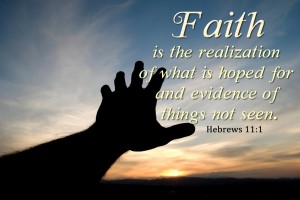How much is enough?
Much has been said and written on the subject of faith; so much so that it is often difficult to clearly discern its exact nature and meaning, especially when expressed without adequate foundation or within appropriate context. The word faith is fraught with nuances and understandings as numerous as those who would speak of it and as a consequence it is often one of the most misunderstood, misconstrued, and misused words found within the English lexicon. The ever increasing tendency toward obfuscation and deliberate linguistic gymnastics only serve to further confuse and mislead those who find themselves on the receiving end of any such pedantic argument.
 The broadest and perhaps coarsest description of faith divides it into two disparate taxonomies of meaning: the secular and the religious.
The broadest and perhaps coarsest description of faith divides it into two disparate taxonomies of meaning: the secular and the religious.
The secular lexicon denotes faith as a strong, confident, and often unshakeable belief in the truth, value, or trustworthiness of a person, idea, or thing; a belief that does not rest on logical proof or material evidence; or allegiance or loyalty to a person or thing. Not so surprising, this particular view of faith seldom if ever provokes controversy, significant dissension, or public outcry.
Any discussion of faith from a religious point of view however will with consistent frequency engender serious heated debate with at times chilling results. The dichotomy between the two views of faith could never be more striking.
The essential article of religious faith is that it is a theological virtue defined as a secure belief in God and a trusting acceptance of God’s will; a body of religious dogma; or a specific system of religious beliefs or principles.
Secular faith directs its energies to tangible and visible targets such as a person, place or thing. Religious faith targets the intangible, unknowable, and invisible divine of which there are many variations, each commanding a multitude of fervent discriminating adherents and therein lies the tension and the resolute disagreement among competing cults. It is indeed fatuously ironic that there is almost universal agreement when it comes to declaring who owns the one true religion and it is always theirs.
But is it enough to state “I believe” or “I trust” in God? Does a simple declaration of faith offer sufficient value or depth to merit and attain salvific grace from the Divine or does the gift of faith place a greater burden upon one’s soul? What exactly do we mean when we say “I have faith in God?” Is that singularly an expression of belief or trust or allegiance to God?
When you seriously consider the nature and meaning of your faith in God you will quite possibly discover that the questions far outnumber the answers. And that is a good thing because delving into the abyss of faith will necessarily open your mind and heart to new and deeper understandings.
Consider that faith is much like prayer. We often view it having one dimension. We pray to God but seldom consider listening for His response. We talk and He listens. We never consider letting Him talk while we listen. And such is our view of faith. We have faith in God but we never stop to consider whether God has faith in us. Perhaps faith might be best defined by the quality and depth of our relationship with God.
It is something to think about. Seriously.
